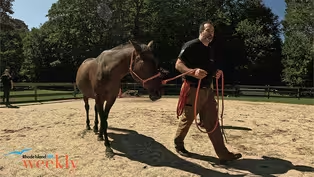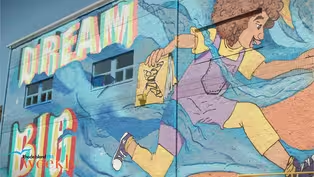
Art of Resistance
Clip: Season 4 Episode 40 | 9m 50sVideo has Closed Captions
Iranian-born artist puts the oppression of women at the center of her art.
Contributor, Dorothy Dickie’s in-depth profile of an Iranian-born artist who puts the oppression of women at the center of her art. Since her time as a grad student at the Rhode Island School of Design, Arghavan Khosravi has used powerful imagery to challenge the fairly restrictive society she grew up in.
Problems playing video? | Closed Captioning Feedback
Problems playing video? | Closed Captioning Feedback
Rhode Island PBS Weekly is a local public television program presented by Ocean State Media

Art of Resistance
Clip: Season 4 Episode 40 | 9m 50sVideo has Closed Captions
Contributor, Dorothy Dickie’s in-depth profile of an Iranian-born artist who puts the oppression of women at the center of her art. Since her time as a grad student at the Rhode Island School of Design, Arghavan Khosravi has used powerful imagery to challenge the fairly restrictive society she grew up in.
Problems playing video? | Closed Captioning Feedback
How to Watch Rhode Island PBS Weekly
Rhode Island PBS Weekly is available to stream on pbs.org and the free PBS App, available on iPhone, Apple TV, Android TV, Android smartphones, Amazon Fire TV, Amazon Fire Tablet, Roku, Samsung Smart TV, and Vizio.
Providing Support for PBS.org
Learn Moreabout PBS online sponsorship- I had a short travel back home in December, 2016 and only a week after I came back to the states, the previous president had been inaugurated and one of his first acts was signing an executive order, the so-called Muslim Ban or travel ban.
- Donald J. Trump is calling for a total and complete shutdown of Muslims entering the United States.
- So if I had stayed in Iran more than a week longer, I couldn't come back and finish my studies.
So my first reaction to this was anger like so many other Iranians in the states and non-Iranians.
I decided to protest to this Muslim ban in my own way.
I wanted to start painting on the pages of my expired password from Iran.
For me, the travel ban was the starting point but the more I worked on this series, the work became less about like that specific political moment and it was started to be more about my memories from Iran because at this point I wasn't sure when I could go back to Iran.
I still haven't been able to travel outside the U.S.. (soft somber music) - The bars don't seem to align.
- [Speaker] They are not.
- [Installer] They are not?
Okay, so that one's probably because- (soft suspenseful music) - In Iran, we have to decide about like our major in high school at the age of 15.
I thought that art is leisure so I should pursue something that my 15 year old mind thought that can rely on as a job.
So I decided to become an engineer.
So I decided math in high school.
But when I wanted to apply to college, I thought that I live only once and I really liked art and I was doing some art classes when I was at high school.
Flash forward 10 years later, when I decided to go to grad school in the States, I decided to to apply for painting.
For me, that was my ambition.
Like any immigrant immigration is a start.
And I thought that it's a start in my career too.
When I came to RISD, my work really changed and also I started to think about what I want to say in my work.
I'm interested in exploring concepts around gender, power dynamics, censorship.
My work is a reflection on my life experiences from Iran and censorship and restrictions are part of our everyday life.
These are a little bit like traumatic memories.
So when I came here, I was sitting in my studio in Providence and I didn't know what to paint and suddenly all these memories rushed to my mind and the geographical distance and the like psychological distance helped me to look at those memories from a slightly different perspective.
And I thought, this is what I want to say.
My work is figurative and also has some surrealistic elements because of a lot of symbolism that I have in my work.
And it's mostly reflecting on my life experiences and memories from Iran.
So it's a lot about women rights issues.
I didn't want to depict women as victims that don't have any agency but still they were trapped in some unpleasant situation.
And I used different symbols to show those restrictions like ropes, ball and chain which is an obvious symbol of lack of freedom.
I'm always inspired by Persian miniature paintings.
I appropriated some battlefield scenes from miniature paintings and combined them, juxtaposed them with figures of women.
And in my mind those battlefield scenes of those soldiers attacking the women, which were by the way, like proportionally smaller than the women, I was thinking of them as a symbol of misogyny or patriarchy.
(bright traditional music) (bright traditional music) After the uprisings in Iran that happened less than a year ago, the women life freedom movement.
I was inspired by the courageous acts of Iranian women and men that took to the streets and the protests to achieve more equality.
Because women had stood up against the suppression, I really wanted to have that change in my work too.
So I decided to appropriate those like the armors that the soldiers in previous works were wearing that were attacking women so that the women now are wearing those armors.
So I made these free standing pieces with like the helmet.
Now the women are wearing those armors.
There were a lot of imagery of quiver and arrows in those miniature paintings that I also appropriated in my own work.
And I replaced the feathers at the end of the arrows with human hair.
In my mind it was like a symbol of this resistance.
'Cause after the movement, I see a lot of images and videos coming from Iran that women defy the compulsory hijab and stop wearing hijab in public and they risk their lives by doing that, they can get arrested or even death.
So for me, that became like a symbol of resistance.
So I incorporated that element in my work.
It makes me feel better when I like talk about these issues in my work.
I want to have some elements of my own cultural heritage and cultural identity but also I want to share the story with others.
And I don't want the paintings to be limited to my own experience.
And because of the symbolic approach I have, I hope that audience that are coming from different cultures, different life experiences, they can find their own selves in the works.
Although I'm talking about human right issues, women right issues, but maybe someone for example, in the states that has experienced, I don't know domestic violence, can also relate to the pieces.
And I think like women rights issues is something universal.
Like even in more progressive countries, there is still a really long path ahead of women to achieve equality.
(soft traditional music) Because my work is a lot about the idea of contradiction, so I try to experiment with this contradiction in different ways.
One of them is to have visual elements that coming from different cultures, different times, contemporary past or like religious, secular, all these contrasting elements because for me it's like a visual translation of my life in Iran.
And most of the people who think freely and they can wear whatever they want and do whatever they want, but when they go in public, they have to adhere to some Islamic regulations that is imposed by the government.
So that contrast for me is like the main component in my practice.
(bright traditional music) (soft somber music) I feel good when I create something.
If I don't paint for a few days, I feel down, I feel depressed.
With images, I can express myself, I can tell my stories and share it with different people.
Like if I make an art that no one sees, I'm not satisfied.
Sharing it with the audience is also a very big part of it.
Video has Closed Captions
Clip: S4 Ep40 | 9m 2s | Visit a farm program for veterans suffering from PTSD that offers healing through horses. (9m 2s)
Video has Closed Captions
Clip: S4 Ep40 | 9m 30s | Three Rhode Island Latinos share how their heritage influences their art and music. (9m 30s)
Providing Support for PBS.org
Learn Moreabout PBS online sponsorship
- News and Public Affairs

Top journalists deliver compelling original analysis of the hour's headlines.

- News and Public Affairs

FRONTLINE is investigative journalism that questions, explains and changes our world.












Support for PBS provided by:
Rhode Island PBS Weekly is a local public television program presented by Ocean State Media

